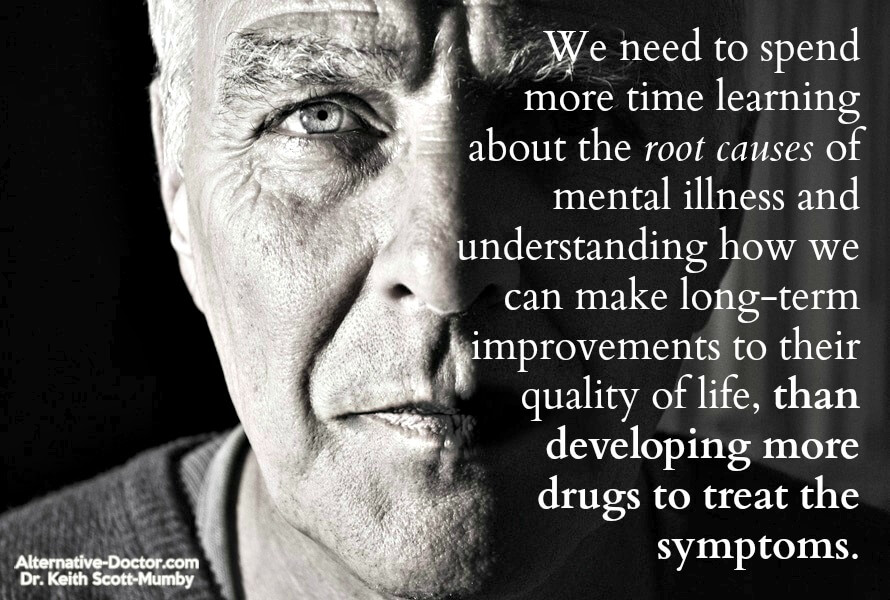Throughout history, the world has been terrified of those who exhibit signs of mental illness. One must wonder if it is actual fear of the person who is mentally ill or instead, fear of somehow “catching” what they have.
Decoding Mental Illness
There are many layers to conditions and diseases of the brain and emotional construct. Despite more than a hundred years of intensive study, we’ve barely scratched the surface of what causes mental illness, how it affects the individual, and how to treat it. In this field, the “trial and error” method has many times caused more damage to patients.
According to the World Health Organization (WHO), more than 450 million people currently suffer from a mental or neurological disorder. They estimate that within our lifetime, there is a one-in-four chance you will experience symptoms or signs of mental illness. More disturbing is that two-thirds of those who have markers for mental illness don’t seek help.
The struggle of mental disorders can be accompanied by a horrific stigma that includes open hostility, discrimination, and mockery. Those who do seek help are confronted with a lack of understanding, doctors who either wish to dope them up or patronize them, and ultimately neglect of their total wellbeing.

Director-General of WHO, Dr. Gro Harlem Brundtland, said, “Mental illness is not a personal failure. In fact, if there is failure, it is to be found in the way we have responded to people with mental and brain disorders.”
Information regarding mental illness on the internet can be filled with fear and incorrect information. In my own research, I’ve seen rambling posts from “sofa physicians” who think access to Wikipedia makes them an expert. Unfortunately, much of the worst information comes from the mentally ill themselves. Tales of self-medicating and methods of easing symptoms can be dangerous to others seeking help.
The National Council for Behavioral Health (NCBH) received funding to train 1 million people to give emergency aid to the mentally ill. This will mean putting a million people in the world trained to evaluate and assist a person in the midst of a mental health crisis.
- Evaluate the circumstances calmly
- Offer encouragement and support
- Listen to what they have to say without judgment
- Try to diffuse the situation as calmly as possible
Given our history of shunning the men and women who suffer from mental illness, this is definitely a step in the right direction. The majority of people would help the victim of a car crash or a person having a heart attack. Perhaps not sure what to do, I think most people would at least attempt to reassure the person until help arrived.
The same is not true with mental illness.
Most will look away, embarrassed or afraid, refusing to get involved or interact with the person at all. Fear of “making a scene” or of being ostracized makes many of those who struggle (as well as their loved ones) hide the issues they’re experiencing. The result is further isolation and hesitation about seeking help.
In the United States alone, someone commits suicide every 13 minutes.
Suicide is the #10 cause of death for all ages but it is the #2 cause of death for young people, aged 10-24 and we must stop this horrific statistic. More young people die from taking their own life than from the result of birth defects, cardiovascular disease, cancer, pneumonia, asthma, and AIDS combined.
Isolation is not the answer. Mass asylums are not the answer. Anti-depressant drugs fail to work for half the patients who take them.
We need to spend more time learning about the root causes of mental illness and substance abuse, understanding how we can make long-term improvements to the quality of life of the mentally ill and drug addicted, than developing more drugs to treat the symptoms. Ultimately, that only helps the pharmaceutical companies.
Understanding mental illness signs means not being afraid to address a person in the midst of a panic attack, post-traumatic stress event, or on the verge of suicide. It is the only way to stem the tide of self-harm and emotional pain that is simply out of a person’s control.
Everyone experiences one or more of the following sometimes. If you have several of these symptoms consistently, then you need to talk to someone before they worsen.
Common Signs of Mental Illness
- Persistent sadness or feelings of hopelessness
- Social withdrawal or apathy about interacting with others
- Changes to sex drive, sleep patterns, or appetite (too much or too little)
- Unusual mood swings, illogical thinking, or unrealistic thoughts
- Heightened anxiety, fear, guilt, or suspicions of others or places
- Feeling out of place or as if the world around you isn’t real, hallucinations
- Abandoning activities or hobbies that once brought you pleasure
- Difficulty maintain school grades or performing at work
- Inability to concentrate, express thoughts, or remember tasks
- Poor hygiene as if you forget to care for yourself
- Feeling stressed or sensitive to sounds, smells, touch, or sights
- Lower coping mechanisms for common stress in your daily life
- Anger or thoughts of violence toward yourself or others
- High risk behaviors, alcohol or drug abuse
- Lethargy or hyperactivity
- Thoughts of taking your life
- Unexplained physical pains in your stomach, back, head, or elsewhere
If you or someone you love is exhibiting signs of mental illness, talk to someone you trust and take things one step at a time. The majority of patients who go through a period of mental upheaval return to their daily lives stronger than ever before with the experience behind them.
You are not alone and you do not have to be afraid.
